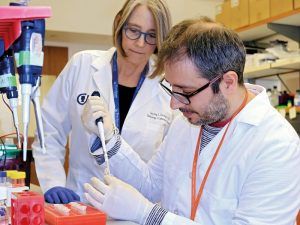Michael Eisenstein in Nature:
 Like most other neurological disorders, Huntington’s disease has proved to be a costly and frustrating target for drug developers. But it also has distinctive features that make it a good match for treatments that target genes. It arises from a mutation in a single gene that encodes the protein huntingtin, and a disease-causing copy of the gene can be readily distinguished from a normal copy by the presence of an overlong stretch of a repeated triplet of nucleotides, CAG. Before turning to CRISPR, Davidson and her colleagues had some success in treating animal models of Huntington’s disease with RNA interference (RNAi), which uses synthetic molecules of RNA to prevent the production of mutant huntingtin — although it took them a considerable amount of time to get there. “We’ve focused the last 17 years on RNAi-based approaches,” says Davidson. However, both this and a promising related treatment for Huntington’s disease that involves antisense oligonucleotides will probably require long-term, repeated administration to provide sustained benefits.
Like most other neurological disorders, Huntington’s disease has proved to be a costly and frustrating target for drug developers. But it also has distinctive features that make it a good match for treatments that target genes. It arises from a mutation in a single gene that encodes the protein huntingtin, and a disease-causing copy of the gene can be readily distinguished from a normal copy by the presence of an overlong stretch of a repeated triplet of nucleotides, CAG. Before turning to CRISPR, Davidson and her colleagues had some success in treating animal models of Huntington’s disease with RNA interference (RNAi), which uses synthetic molecules of RNA to prevent the production of mutant huntingtin — although it took them a considerable amount of time to get there. “We’ve focused the last 17 years on RNAi-based approaches,” says Davidson. However, both this and a promising related treatment for Huntington’s disease that involves antisense oligonucleotides will probably require long-term, repeated administration to provide sustained benefits.
By contrast, CRISPR could achieve the same benefits through a single dose that permanently inactivates the defective gene with remarkable efficiency, as Davidson’s team demonstrated last year1, both in cells from people with Huntington’s disease and in mouse models of the condition. “I was surprised how easy it was — I think that’s the beauty of the system,” she says. In the past five years, several teams of researchers have independently shown that genome editing can reliably eliminate the gene that encodes mutant huntingtin, thereby halting the production of the toxic protein and its accumulation into clumps in experimental models.
But clearing protein clumps in mice is of questionable value when researchers often struggle to translate such findings into treatments for people — in general, potential therapies for brain disorders have a long history of failure and disappointment in clinical trials. Accordingly, the early adopters of CRISPR are trying to obtain clearer evidence of its probable clinical benefits while grappling with thorny questions related to its safety, efficacy and delivery that it is crucial to answer before trials in people can take place. “I believe we can now seriously consider clinical strategies to edit huntingtin,” says Nicole Déglon, a neurologist at the Lausanne University Hospital in Switzerland, “but I would say we are still at the very beginning of the story.”
More here.
